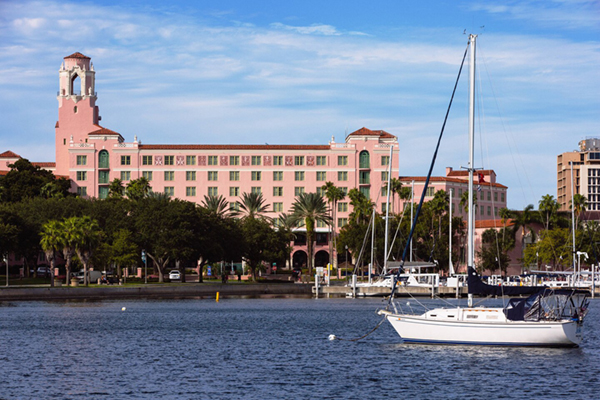UMC 2020 • Focus and Call for Papers
The World’s Largest Gathering of Ocean Mineral Stakeholders
Marine Minerals: Solutions for a Clean Energy Future
49th Underwater Minerals Conference
September 27 – October 2, 2020
The Vinoy® Renaissance — St. Petersburg Resort and Golf Club
St. Petersburg, Florida USA
Focus
The special metals found in rich deposits on the deep ocean floor are critical for smart electronics and crucial green technologies, such as solar power and electric cars. But as the world’s population rises, demand is now outstripping the production from mines on land for some important elements, like cobalt. The ocean mining business players say the extraordinary richness of the underwater deposits mean the environmental impacts will be far lower than on land. But critics say exotic and little-known ecosystems in the deep oceans could be destroyed and must be protected. This is where the dilemma starts.
The idea of tapping the seabed in this way is obviously attractive. Our insatiable thirst for gadgets, electric cars, and clean power has created huge demand for rare and precious metals that are currently mined — often unethically, sometimes at great expense — here on land. Scraping up the requisite materials from the deep blue would provide a way to ensure that the demands of the future are met, and it’s easy enough to see that pioneers of the approach could also make their millions in the process.
Mines on land often require forests and villages to be cleared, overlying rocks to be removed and roads or railways to be built in order to extract ores with relatively weak concentrations of minerals. In addition, the majority of these mines are found in developing countries with fragile governments, where sometimes even children are working in extremely improper and unhealthy ways. By contrast, mines on the seabed would extract far richer ores, covering a smaller area and with no immediate impact on people — but instead killing marine life wherever mining machines are deployed. It is important however to remember that deep sea minerals are usually found below 1000m depth of water, which means that there are no coral reefs around, and a very small density and marine life would be affected.
An early analysis of deep-sea mining tests showed that even small trials can damage marine ecosystems. The worry is that larger operations will cause far more damage, and it’s unclear what the wider ramifications might be if ecosystems are disturbed. “If the world agrees to invest in green energy supplies, then we need the raw materials to make the devices that produce and store this energy. The raw materials have to come from somewhere. We can either dig them up from the ground and make a very large hole or dig them from the seabed and make a comparatively smaller hole. It›s a dilemma for society — nothing we do comes without a cost.” – Dr. Bramley Murton, National Oceanography Centre (NOC, UK).
In summary, the essential metals found in deep waters are the resources required to create a significant quantity of green energy, and yet extricating them could be harmful to the environment. The open question remains: does the benefit of the former outweigh the potential fallout of the latter? Answering that may not be straightforward, but it would get us further toward understanding whether we’re really ready to mine the depths.
Important Deadlines
- Deadline for abstract submission (3000 characters max.): May 5, 2020
- Notification of acceptance: June 5, 2020
- Deadline for final full paper submission: June 30, 2020
- Deadline for Early Bird Registration: May 31, 2020
[ Top of this page ]
Be a Speaker at UMC 2020
Thank you for your interest in speaking at the UMC 2020 conference. The UMC and IMMS are committed to providing the latest evidenced-based, non-biased scientific content to our participants. We are always looking for knowledgeable, energetic, experienced, and academically recognized speakers who want to share their expertise and / or research findings to all interested parties.
Your abstract and expertise will be reviewed with consideration to our identified needs assessment results, to this year›s conference focus, peer-reviewed journals, and ongoing stakeholder evaluation recommendations. Please note, if invited to speak, you may be presenting to an audience of 300+ ocean mining stakeholders who will be participating in a 5-minute question and answer session at the end of your presentation.
The abstract should have no more than 3000 characters and should be sent by May 5th, 2020. We will notify you about the acceptance in June and you will have one month from this date to send us the full paper / article. This would be the entire written work, not your presentation. Your presentation is only due a few days before the conference and it should be tailored to fit a 20-minute presentation. Please send us an e-mail with your abstract for consideration: lazevedo@immsoc.org.
Download the Call For Papers PDF.
Conference Contacts
For assistance and inquiries, please contact:
- Laura Carvalho B.C. Azevedo
- UMC Conference Manager
- University of South Florida
- College of Marine Science
- 830 1st Street S
- St. Petersburg, FL 33701 USA
- lazevedo@immsoc.org
[ Top of this page ]




